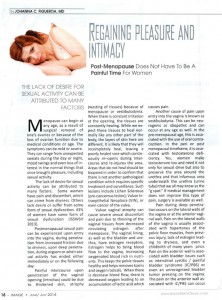Articles
Learn More About Female Sexual Issues From Dr. Johanna Figueroa
Regaining Pleasure and Intimacy
by Dr. Johanna C. Figueroa, M.D., published in the June/July issue of Image Magazine
Menopause can begin at any age as a result of surgical removal of the ovaries or because of the loss of ovarian function due to medical conditions or age. The symptoms can be mild or severe ranging from unexpected sweats day or night, mood swings, even loss of interest for the normal things that once brought pleasure including sexual activity. The lack of desire for sexual activity can occur for many reasons. Some women have pain and discomfort which may be attributed to dryness. Others lack desire or suffer from some form of sexual dysfunction. 43% of women have some form of sexual dysfunction (ISSWHSH 2013).
Postmenopausal sexual pain can be experienced upon entry into the vagina, during penetration from increased friction due to dryness, upon deep penetration, during orgasm or when sexual activity has ended either immediately or on the following day.
Painful intercourse upon penetration of the vaginal opening (introitus) could be due to thickened skin, atrophy (wasting of tissues) because of menopause or vestibulodynia. When there is constant irritation at the opening the tissues are constantly healing. We expect these tissues to heal normally like any other part of the body but the layers of skin here are different. Likely they incompletely heal, leaving a poorly healed sore which continuously re-opens during intercourse, re-injuring the area. Areas that do not heal should be biopsied in order to confirm that there is not another pathological condition which requires specific treatment and surveillance. Such lesions include Lichen Sclerosus (pre-cancerous lesion), Vulvar Intraepithelial Neoplasia (VIN), or even Cancer of the Vulva.
Vulvar vaginal atrophy can cause severe sexual discomfort and pain due to thinning of the vaginal tissues from decreased circulating estrogen after menopause. The vaginal lining as well as the bladder and urethra have estrogen receptors. Estrogen helps to bring blood flow to the vagina increasing oxygenated blood full of nutrients. This keeps the pelvic tissues healthy and helps removes toxins and oxygen radicals. When there is decrease blood flow there is decreased oxygen leading to an accumulation of lactic acid which causes pain.
Another cause of pain upon entry into the vagina is known as vestibulodynia. This can be neurogenic or idiopathic and can occur at any age as well. In the pre-menopausal age this is associated with the use of oral contraception. In the peri or post menopausal period it is associated with testosterone deficiency. Yes, women make testosterone too and need it not only for sexual drive but also to preserve the area around the urethra and that infamous area underneath the urethra (urine tube) that we all may know as the “g spot.” If medical management does not improve this type of pain, surgery is available as well.
Pain during deep penetration occurs on the lateral walls of the vagina or at the anterior vaginal wall. Pain on the lateral walls of the vagina is usually associated with hypertonus of the pelvic floor muscles, from previous injury, lack of estrogen leading to dryness, and even child birth of many years ago. Pain on the anterior wall is associated with bladder issues such as interstitial cystitis / painful bladder syndrome (IC/PBS) or even an unrecognized bladder tumor pressing on the vagina. The pain on the anterior wall associated with IC/PBS can occur immediately after sex or even a day or too later mimicking symptoms of a urinary tract infection.
Pain with intercourse at any age is NOT normal. These symptoms not only can affect the women experiencing such symptoms but they can directly affect loved ones. Initially some symptoms are treated as depression; other experts choose to treat these symptoms with hormonal replacement. Female sexual dysfunction experts use a multi-modal approach. Hormonal therapy both systemic and vaginally, pelvic floor therapy, sex therapy and involvement of both partners is a must to have a successful outcome. I can’t stress enough that beginning treatment will not provide an overnight cure. It can take weeks or months before one can feel comfortable to have sex again. The physician and the patient both must be dedicated and committed to participate actively with frequent visits and be open to the possibility to alter therapy along the way.
